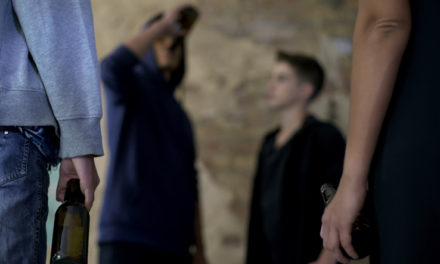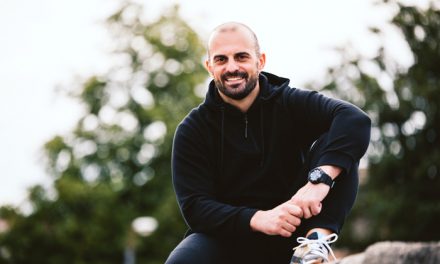This interview is the first in a series that will feature different perspectives of addiction from different people in my life. I believe it is critical to share personal experiences of how addiction and recovery impact relationships in order to unite people together, broaden expectations, and raise awareness.
“Like most people, there have been many in my life who have struggled with varying degrees of addictions. But back when I was a kid, my mom developed an alcohol addiction,” says Joe S*. Joe is a fifty-five-year-old non-profit director, who has been married for almost thirty years and is a father of four.
Joe was eleven years old when he first realized that there was something bothering his mother. “Because I was so young, it took a while to dawn on me that this change in her had to do with the drinking.” Joe’s parents had been divorced, so his mom was the only adult living with him, his older brother, and two younger sisters. “When she was ‘not being herself,’ one of us kids would have to fill in that role.”
Joe’s older brother moved away to live with their dad, making Joe, at thirteen years old, the one responsible for the family when their mom was drinking. “I had to protect my younger sisters; Mom was really anxious—she was never physically abusive—but she was anxious to the point of it being extremely hard for anyone to be around her.”
One of the hardest parts of growing up under their mom’s alcoholism was deciding how to respond: “We had to choose between saying something about her addiction, or just trying to steer clear of it and stay quiet.”
“I remember being forced to confront her. Sitting across from her at the counter, telling her that ‘we know her drinking is a problem and that she has to stop for the sake of the family.’ She looked back at me, not saying anything, just crying and nodding like ‘yes, I know.’”
Joe emphasized how difficult it was for his mom to talk about her addiction with anyone, and how much more so it would be with her own child. Her shame about the addiction seemed to be more burdensome and harmful to her than the alcohol itself.
After about forty years, Joe believes alcoholism is still a part of his mom’s life. “I don’t see her as much as I used to and she’s still very secret, so I’m not sure how much it’s affecting her everyday life. It’s not to the degree that it was growing up, but it definitely still hinders her from being free and from being the person that she would like to be.” As an adult, Joe has again tried to confront her but every time he asks her to talk about it she simply says, “I cannot.”
As time passed and distance grew between himself and his mom when her alcoholism was at its worst, Joe learned a lot about addiction:
- Shame- “I understand that struggling with an addiction can also mean struggling with a debilitating shame.”
- Empathy – “I’ve gained empathy for others who are alcoholics or are children of alcoholics, and compassion for how hard it is to change something like an addiction.”
- Realism- “She’s almost 80 years old now and I don’t feel like I have to press the issue anymore. She’s making it, she’s still a loving person and she can keep down a job; so I’ve had to learn that it’s just a part of who she is right now.”
Another thing Joe has learned through his mom’s alcoholism is co-dependency. To Joe, this means that “if someone that I’m close with is stressed or struggling, then I can’t be at peace and I feel very anxious until I help that person feel better.”
But he wanted to make clear that this unhealthy coping mechanism is not in direct response to his mom’s alcoholism. Joe said that he’s not exclusively a victim and although that’s how it started, he’s always had an active choice in how to respond.
The environment that started his co-dependent habits also shaped his perspective on alcohol, drugs and parenting. Growing up with his mother’s alcoholism deeply imprinted a fear of addiction into Joe. There was a constant mental warning of addiction’s “hereditary” trait as he went through high school and college, and as he’s raised four children.
Joe admitted that when he was a teen, “I even had nightmares of people kidnapping me and forcibly addicting me to heroin.” He never experimented with any drugs or binge drinking. “I did and still do drink alcohol some. But I have always been strongly on my guard to not drink too much, and to never make drinking a secret from my family.”
When asked if Joe could say one thing to his mother that he knew she would hear and understand:
“It’s okay, Mom. It’s okay. You’re an amazing person, even if you’re struggling with alcohol.”
When asked if he could say one thing to a reader who has a parent who’s struggling with alcoholism, Joe remained quiet for a few moments. “When you asked that question, I felt tears coming to my eyes. There must still be some hurt from when I was kid.” His compassion and empathy for other children in that situation was tangible. He decided that he would say:
“God understands and He’s with you; anytime that you’re thinking that it’s only you who knows the pain you feel, it is not. You are seen and you are heard and our Father in heaven weeps along with us when we are in those situations.”
Joe then continued to urge anyone in that situation to get help, and to talk to a trusted adult in his or her life or someone at a recovery center like the Aviary. He also emphasized that speaking out would not be hurting but helping the parent. Finally, when asked what Joe would say to any parent who’s struggling with addiction:
“Your child cannot confront you about this. You are hurting your children. Wake up and get help. Don’t let shame be the winner here.”
*Names have been changed to protect privacy.










